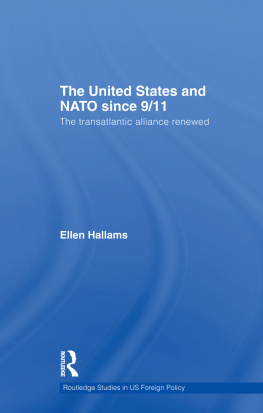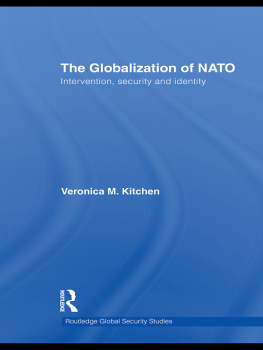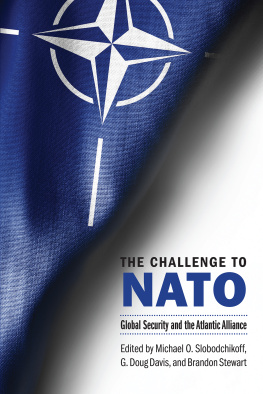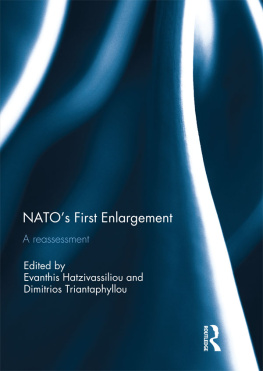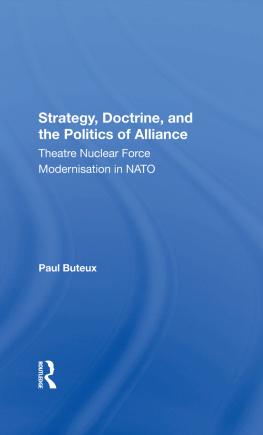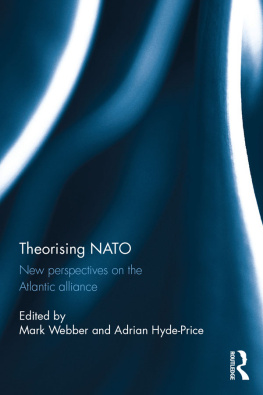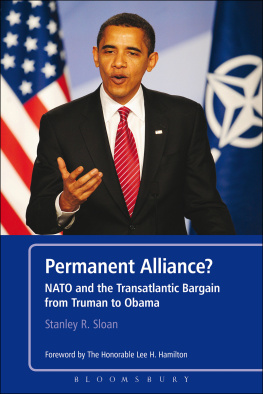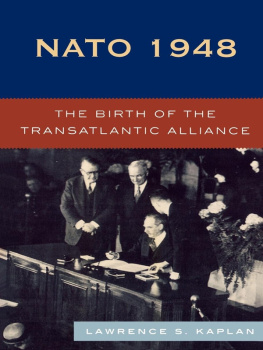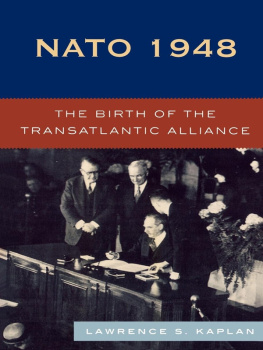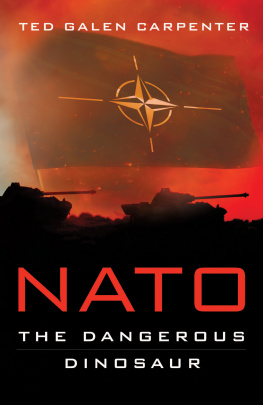The United States and NATO since 9/11
Dr Hallams strikes a timely and persuasive blow on behalf of our much abused, but still indispensable, NATO Alliance.
Professor Colin S. Gray, University of Reading
The US decision not to work through NATO after 9/11 left many European members of the alliance feeling deflated. This decision reflected not only the unilateralism of the Bush Administration, but also the belief that US operational freedom and flexibility had been hampered during NATOs two Balkans interventions.
This book examines US attitudes to, and perspectives on, the transatlantic alliance, with a particular focus on USNATO relations since 9/11. It demonstrates that, following the decision to bypass NATO after 9/11, the Bush Administrations perceptions of the alliance shifted due to a belated recognition that NATO did indeed have much to offer the US. Hallams explores NATOs contributions to post-combat reconstruction and stabilisation operations in Afghanistan and Iraq, and argues that the events of 9/11 galvanised NATO into undertaking an accelerated program of transformation that has done much to reinvigorate the alliance.
This book offers an optimistic assessment of the transatlantic alliance, counter-balanced by realistic reflections on the problems it faces. Drawing on interviews with US and NATO officials, it argues that NATO is far from irrelevant and that prospects for the alliance remain fundamentally positive; it will be of interest to students and scholars of US Foreign Policy, American politics, international relations, security studies and transatlantic studies.
Ellen Hallams is Lecturer in Defence Studies at Kings College, at the Joint Services Staff and Command College, UK. She has published articles in Contemporary Strategy , the Journal of Transatlantic Studies and Janes Intelligence Review .
Routledge studies in US foreign policy
Edited by Inderjeet Parmar
University of Manchester
and
John Dumbrell
University of Durham
This new series sets out to publish high quality works by leading and emerging scholars critically engaging with United States foreign policy. The series welcomes a variety of approaches to the subject and draws on scholarship from international relations, security studies, international political economy, foreign policy analysis and contemporary international history.
Subjects covered include the role of administrations and institutions, the media, think tanks, ideologues and intellectuals, elites, transnational corporations, public opinion, and pressure groups in shaping foreign policy, US relations with individual nations, with global regions and global institutions, and Americas evolving strategic and military policies.
The series aims to provide a range of books from individual research monographs and edited collections to textbooks and supplemental reading for scholars, researchers, policy analysts, and students.
United States Foreign Policy and National Identity in the 21st Century
Edited by Kenneth Christie
New Directions in US Foreign Policy
Edited by Inderjeet Parmar, Linda B. Miller and Mark Ledwidge
Americas Special Relationships
Foreign and domestic aspects of the politics of alliance
Edited by John Dumbrell and Axel R. Schfer
US Foreign Policy in Context
National ideology from the founders to the Bush doctrine
Adam Quinn
The United States and NATO since 9/11
The transatlantic alliance renewed
Ellen Hallams
The United States and NATO since 9/11
The transatlantic alliance renewed
Ellen Hallams
First published 2010
by Routledge
2 Park Square, Milton Park, Abingdon, Oxon OX14 4RN
Simultaneously published in the USA and Canada
by Routledge
270 Madison Ave, New York, NY 10016
Routledge is an imprint of the Taylor & Francis Group, an informa business
2010 Ellen Hallams
Typeset in Times by Wearset Ltd, Boldon, Tyne and Wear
Printed and bound in Great Britain by TJI Digital, Padstow, Cornwall
All rights reserved. No part of this book may be reprinted or reproduced or utilised in any form or by any electronic, mechanical, or other means, now known or hereafter invented, including photocopying and recording, or in any information storage or retrieval system, without permission in writing from the publishers.
British Library Cataloguing in Publication Data
A catalogue record for this book is available from the British Library
Library of Congress Cataloging in Publication Data
Hallams, Ellen.
The United States and NATO since 9/11: the transatlantic alliance renewed/Ellen Hallams.
p. cm. (Routledge studies in us foreign policy)
Includes bibliographical references and index.
1. North Atlantic Treaty OrganizationUnited States. 2. United StatesForeign relations20012009, 3. United States-Foreign relations2009 I. Title
UA646.5.U5H35 2010
355'.031091821-dc22 2009021121
ISBN10: 0-415-55368-7 (hbk)
ISBN10: 0-203-86522-7 (ebk)
ISBN13: 978-0-415-55368-1 (hbk)
ISBN13: 978-0-203-86522-4 (ebk)
Contents
When Paul Wolfowitz visited NATO in the aftermath of the 9/11 terrorist attacks on New York and Washington DC to inform the alliance that the US would not be seeking collective NATO action, it seemed to many that the final nail had been hammered into NATOs coffin. The vultures once again began circling, lamenting the last days of the Atlantic Alliance. Those same vultures had hovered persistently since the Berlin Wall came crashing down, and with it, NATOs raison dtre. Although the alliance had managed to endure a tumultuous post-Cold War era that saw it confront violence and instability in the Balkans, the Bush Administrations decision to effectively turn its back on NATO at a time when the alliance had just invoked the Article V guarantee for the first time in its history, seemed to many an irrevocable blow from which NATO could not recover. Following the invocation, the United States was inundated with allied offers of moral and practical support for the War on Terrorism declared by the Bush Administration. However, despite reports that NATO was preparing plans for a major operation in Afghanistan, the US chose instead to bypass the alliance, utilising ad hoc coalitions that were perceived as offering Washington greater operational freedom and flexibility. The NATO alliance that had served as the bedrock for transatlantic security for over 50 years was seemingly cast adrift, as the US simply sought to use it as a toolbox from which it could pick and choose what it wanted.
The Bush Administrations marginalisation of the alliance was not, however, the catastrophic blow to the alliance some predicted. Focusing specifically on US attitudes to NATO, this book seeks to refute those critics who argue that the US has or is likely to turn its back on the alliance. It addresses a number of major questions which have arisen since 9/11 and during the course of US- led operations in Afghanistan and Iraq: Why had the US, which had demonstrated its enduring commitment to NATO during the Cold War and the 1990s, turned away from the alliance at a time when it offered unwavering support to the US? Was the US right in its decision to opt for a more flexible approach, rather than utilising the institutional structures and military capabilities of NATO? What advantages did coalitions of the willing have over NATO? What were the wider implications for the alliance? To what extent does the US remain committed to NATO?

